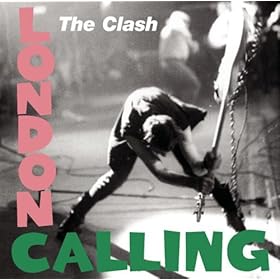
I shouldn't have to defend this record for its artistic merit. It's an utterly useless exercise (because it shouldn't need to be said), and if I honestly have to defend it I will go bonkers. That being said, this was the record that changed my life. I'm really not going to lie about that. Let me state my case:
When I was in high school, for better or for worse, I got caught up in what I consider to be the "neo-punk" movement. Green Day, blink-182, the works. Not only is this not really what can be considered "good" to "great" music, it started me down a bad road. I'm not saying I got to the point of drugs or anything, but I started hanging out with less than savory crowds and who knows what would have happened if I had stayed there. To me, punk and "neo-punk" was a sound, pure aggression, little else. There was a bad guy, and a worse guy. Fight the power with any means necessary, while languishing in the recesses of society. That's the kind of view I was surrounded with. Perhaps in retrospect I'm simplifying the situation or casting my situation in the early high school years as worse than they actually were, but at least now in retrospect I see that period of my life as close to a dead end as I could have ever been. But this record changed every single thing that I thought was true, and changed me.
I realized after this record that punk wasn't a sound. Punk was not about heavy distortion and power chords. It wasn't the balls-to-the-walls, blow-shit-up, or the backed-into-a-corner-and-about-to-explode mentality that I had thought it was. Thanks to Joe Strummer, I realized punk was an aesthetic. More or less, it was a do-it-yourself mentality. No one gives you your breaks; you make them yourself. But moreover, punk music is more or less what you make of it. This point was hit home on another record I might talk about down the road, the Minutemen's Double Nickels on the Dime. There were things in this world that you could change, and that should be the driving force in all you can do. It's common sense, but music often doesn't promote it. But the Clash were common sense, in their own way. In some ways they exhibited the tenets of "neo-punk" that I've railed against thus far, but the Clash differs in that they actually meant what they said. They meant change. "Neo-punk" loves staying in their corner, singing about how they'll explode and change the world, but doing nothing about it. Utterly useless. The Clash? They meant what they said, and their word was good.
They meant good...they meant to change what they could. Tales of generosity about the Clash are many, but the best (and funniest) concern the sales of their records at outrageously low prices. To sell London Calling as a double album for the price of one, the story says they managed to con the record company into attaching another EP record (or similar short-play format) to their standard album by saying they were including a B-side when in fact they were including another disc entirely. Reportedly, the Clash forwent the royalties on Sandanista! to sell the triple-album for the price of one. And perhaps the most telling, Joe Strummer would wait and talk to every fan who wanted to talk, after every show. These were real guys. Fame didn't get to them. They were real dudes, but they had a mission. They weren't just malcontents, they were malcontents who knew they had every power in the world to make things right. And that's the crux of the record. And that's the crux of how I changed entirely. Small changes can yield great results.




No comments:
Post a Comment